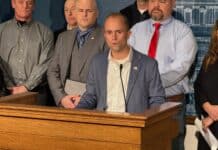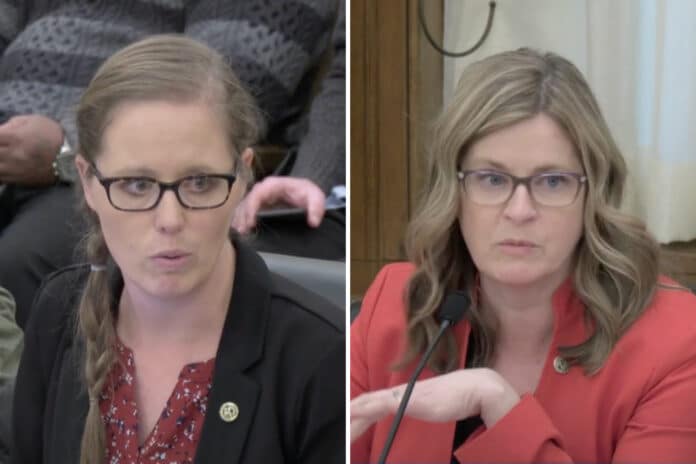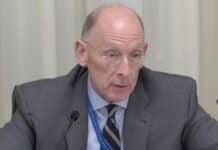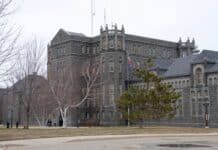Last year, the Minnesota Department of Corrections (DOC) instituted a policy which allows incarcerated men who identify as female to transfer to the state’s only women’s prison. The first transfer took place in June of 2023.
The DOC’s transgender policy, which was updated earlier this year, requires correctional staff to respect a prisoner’s preferred gender identification. Additionally, the policy created both an “Agency Gender Identity Committee” and a series of “Facility Gender Identity Committee[s].”
These committees are responsible for making case-by-case decisions about cell assignment, shower arrangements, and other matters specific to prisoners who are “transgender, gender diverse, intersex, or nonbinary.”
Earlier this month, DOC Commissioner Paul Schnell gave a presentation about Minnesota prisons and corrections to a committee of the Minnesota House of Representatives.
At that meeting of the House Public Safety Finance and Policy Committee, Rep. Patricia Mueller, R-Austin, inquired about the status of the transgender policy, how it affects female prisoners, and what the DOC is doing for women who feel unsafe because of the male prisoners.
“I have an article that says that there’s now up to five or six of these inmates who are transgender, and several anonymous women are talking about how uncomfortable they are having fully intact males in a women’s prison,” said Mueller.
However, the chair of the committee, Rep. Kelly Moller, DFL-Shoreview, interjected and shut down discussion of the issue before Commissioner Schnell could respond.
“I’m actually not going to turn it over to the commissioner right now for that because I don’t know what anonymous source that you’re referring to, and we need to keep moving,” said Moller.
WATCH: Rep. Patricia Mueller (R-Austin) tried to ask questions about the Dept. of Corrections controversial trans policy allowing biological men in Minnesota’s only female prison.
Rep. Kelly Moller (DFL-Shoreview) would not allow them to be answered. pic.twitter.com/oJ0cseE0pI
— Liz Collin (@lizcollin) December 29, 2024
The DFL lawmaker further stated that there were other people who were waiting to speak, and the committee could have Schnell come back at any time to discuss the matter.
“We’re not gonna go into that discussion right now,” said Moller, referring to the transgender policy.
Neither Rep. Moller nor staff with the House DFL Caucus returned media inquiries for this story. Meanwhile, the DOC sent a statement to Alpha News.
“The Department of Corrections is committed to providing a safe and secure environment for everyone who is housed in state facilities. Specialized populations create unique considerations that the DOC continues to best navigate in terms of safety, security and access to appropriate services,” the DOC said.
“In accordance with agency policies and the training provided to people as they enter correctional facilities, the DOC strongly encourages incarcerated individuals to bring forward any safety concerns so that they can be assessed and accordingly addressed. The DOC has and will continue to look into safety complaints. In some instances, the agency has only recently become aware of complaints through media accounts and reporting.
“As noted by Representative Kelly Moller, chair of the Public Safety Finance and Policy Committee, it is anticipated that there will be specific committee time in the upcoming legislative session devoted to issues surrounding people who are transgender, gender diverse, intersex, or nonbinary, or have gender dysphoria or other similar medical/clinical diagnoses.”
Rep. Mueller says Minnesotans deserve answers
“I have had the opportunity to hear the stories of several incarcerated females who want to put in the work to be rehabilitated at the DOC facility in Shakopee,” Mueller told Alpha News. “The women want to safely serve their sentences and be able to rejoin society as upstanding citizens. Unfortunately, without fostering an environment conducive to rehabilitation that becomes increasingly more difficult.”
Mueller elaborated, saying that many of the female inmates at the Shakopee women’s prison have “past traumas that make being coerced to share private spaces like bathrooms and showers with intact biological men completely antithetical to their rehabilitation.”
Additionally, the Republican lawmaker stated that many of the women prisoners tell their stories anonymously because they fear retaliation from male inmates with “a physical, biological advantage and criminal histories that include sexual assault against women and children.”
Earlier this month, Alpha News spoke with a female prisoner who is incarcerated at the Shakopee women’s prison. In an exclusive interview, the female inmate talked about being forced to share a prison with several male prisoners.
“Minnesotans deserve answers to their reasonable and valid questions. These are concerns shared by people of all political stripes. This shouldn’t be about partisan politics or hurting anyone’s feelings, this should be about keeping women safe,” added Mueller.
Incoming committee chairman wants answers
When the new legislative session begins in January, the House will have 67 Republicans, 66 Democrats, and one vacancy. As such, the Republicans will likely be able to organize the House to their liking and select GOP chairs for the chamber’s various committees.
The incoming Republican chairman of the House public safety committee, Rep. Paul Novotny, R-Elk River, told Alpha News that he has a meeting scheduled with Commissioner Schnell in January and plans to discuss the DOC’s transgender prisoner policy at that meeting.
“We expect to get an outcome under the new leadership,” said Novotny.
Liz Collin contributed to this report.
Update: A previous version of this story incorrectly stated that the DOC did not provide comment prior to publication. This story has been updated with a statement from the DOC.











